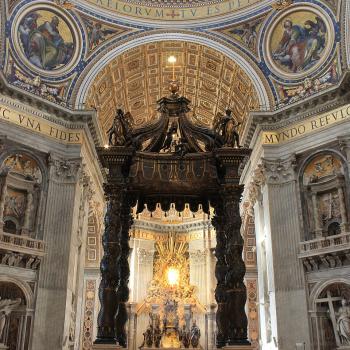Deacon Greg Kandra, over at The Deacon’s Bench, has a post today that pays a specifically Catholic and Christian tribute to the laborers of the world.
In all the ridiculous campaign hype about who “built this” we’ve forgotten that whatever it is, be it sky scraper, family home or interstate highway, it was laboring men and women who actually built it. They built it by the sweat of their brow, often for low wages and before they achieved the benefits won for them by organized labor, with no job security, retirement or health care.
As the daughter of a mechanic, the granddaughter of both a railroad engineer and a cowboy (I mean that. An actual, working cowboy who trained horses for the Cavalry in WWI.) and the Representative of tens of thousands of working people, I am proud to be part of a Church who sees the dignity and the value of the irreplaceable contributions of working people to our civilization.
Deacon Greg’s post is a quote from a former blue-collar worker, Pope John Paul II. It reads in part:
For Labor Day: “By means of work, man participates in the activity of God himself”
September 3, 2012 By Deacon Greg Kandra

“I come from your midst. I come from the quarries of Zakrzowek, from the Solvay furnaces in Borek Falecki, and then from Nowa Huta. Through all these surroundings, through my own experience of work, I boldly say that I learned the gospel anew.” — Pope John Paul II, homily in Nowa Huta, Poland, July 1979.
“The truth that by means of work man participates in the activity of God himself, his Creator, was given particular prominence by Jesus Christ-the Jesus at whom many of his first listeners in Nazareth “were astonished, saying, ‘Where did this man get all this? What is the wisdom given to him?.. Is not this the carpenter?’.” For Jesus not only proclaimed but first and foremost fulfilled by his deeds the “gospel”, the word of eternal Wisdom, that had been entrusted to him. Therefore this was also “the gospel of work”, because he who proclaimed it was himself a man of work, a craftsman like Joseph of Nazareth. And if we do not find in his words a special command to work-but rather on one occasion a prohibition against too much anxiety about work and life- at the same time the eloquence of the life of Christ is unequivocal: he belongs to the “working world”, he has appreciation and respect for human work. (Read more here.)












